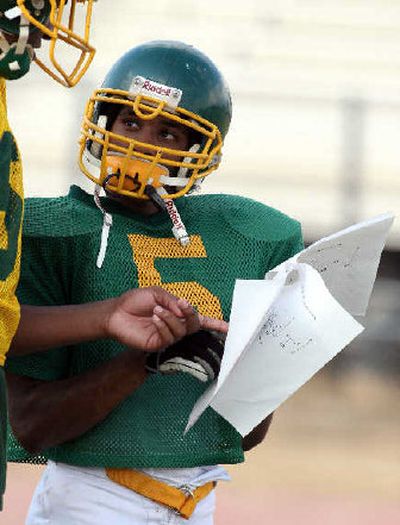Evacuees find grid home

DALLAS – Damien Allen tugs at his tight pants after each play, struggling to stretch a size L into an XL.
The other players are wearing shorts. But not most of the evacuees, who quickly pieced together their uniforms scavenging through leftovers in a sweat-scented equipment closet. Only some of the 13 found shorts, and a few must share helmets.
Monday was their first football practice at Madison, the designated high school for students still living in mass downtown shelters nearly two weeks after Hurricane Katrina. They practice wearing colored paper bracelets that grant admission back to their cots and free meals – orange for Reunion Arena, neon pink for the convention center.
None is a superstar or a fixture on recruiting watch lists. Head coach Ronald Johnson figures maybe two can contribute at the varsity level.
Twice as many signed up last week, but they disappear once they find homes and leave the shelters. Fifteen passed physicals Friday and two moved to suburbs by the weekend. Johnson doesn’t see many of the kids whose parents he met at the shelters, where Johnson and his staff navigated through a grid of cots in search of signed waiver forms.
“Two more will probably be gone by tomorrow,” said Johnson, who can only identify a handful by their first names.
He doubts that some played football in New Orleans, even though many brag of throwing touchdown passes and anchoring defenses back home. One drill and Johnson knows better. If he’s unsure, he quizzes them: What’s a double-team block? When pulling right, which foot leads?
Sophomore Michael Bridgewater played linebacker at Higgins High School near New Orleans. His mother brought Michael and two cousins to Reunion Arena after they could no longer afford staying at a Motel 6. He can’t reach his girlfriend and doesn’t know what happened to an uncle and four of his cousins.
He’s also, if he stays at Madison, an option at fullback.
“I’m homeless right now, but that’s the last thing on my mind,” Bridgewater said. “I’m living in a shelter. I never thought in a million years I’d be living in a shelter. But don’t feel sorry for me. Encourage me. That’s why I’m out here.”
The evacuees stick together. They play catch during water breaks and crowd around leafing through a stapled playbook on the sideline. They seldom mingle with the other players.
Except for Allen. He practices with the first team at right tackle, because Madison’s usual starter tore his anterior cruciate ligament Friday. Nothing about Allen’s hastily mismatched uniform properly fits the tall and thickset teenager, except for the gloves and ankle bracelet he salvaged from his flooded home near Jefferson Parish.
“When we went back to our house, I ran to my room and those were the first things I got,” said Allen, 16. “I thanked God when I saw my football trophies were OK.”
The rest of the home wasn’t as fortunate. The air conditioner tumbled to the other side of the home, and the side gate snapped from its hinges. The air “smelled like death.”
After practice, a school bus shuttles the evacuees to their shelters downtown. The short ride is raucous. One player is dropped at a hotel before the driver heads toward the convention center. When she’s unsure of where to turn, those wearing pink bracelets correctly instruct her to wait until she reaches the light.
They can’t name the streets but know the area – walking around the city is sometimes all they can do to pass the time.
“I wouldn’t mind staying down here,” said Johnathan Boyd Jr., still a little bothered because he spent his first practice as a backup. “I like Dallas.”
Allen exits the bus and finds his parents a block from the convention center. They spent the day at the downtown library, where both searched jobs on the Internet. Cynthia Allen was a state social worker and wants to find a similar job around Dallas.
“Right now I question what is normal,” she said. “Some days I have to do my best to not break down and cry. But for Damien, football is normal. It’s in his blood.”
Damien’s mom then breaks the news – the family received two free weeks at an Arlington hotel, about 30 miles from Madison. After just one day with the team, he will likely transfer again.
He understands. He knows he can play football somewhere else. He slips on his headphones – listening to songs he says remind him of New Orleans – and walks back toward the convention center for probably his last night.
“What happened was a tragedy, and there was nothing we could do about it,” Allen said. “When I was on the field today sometimes my mind got sidetracked about what’s going on. But I just take that anger and put it toward football.”